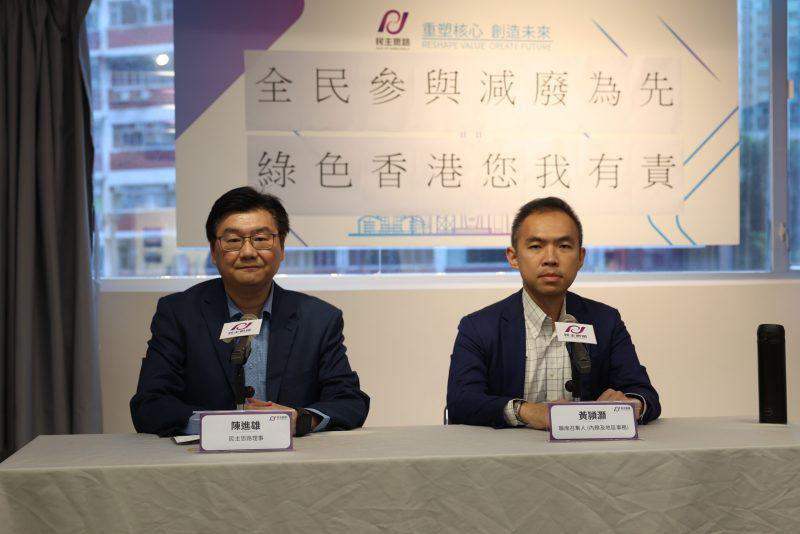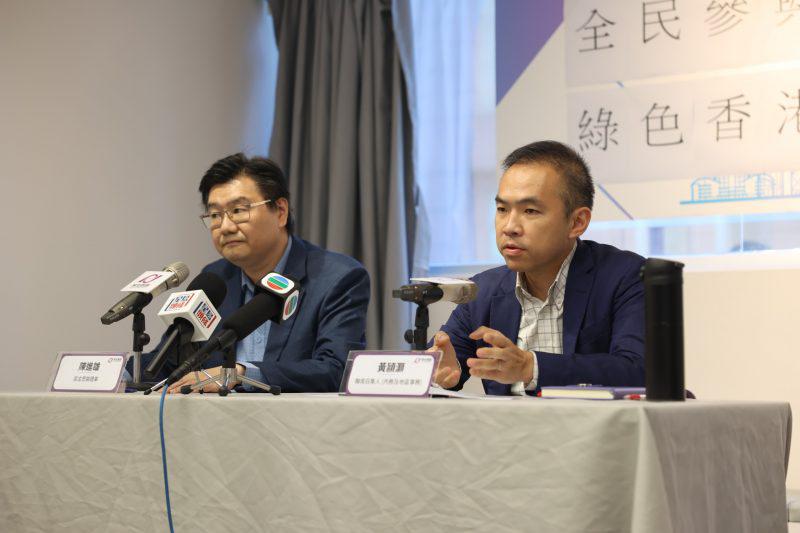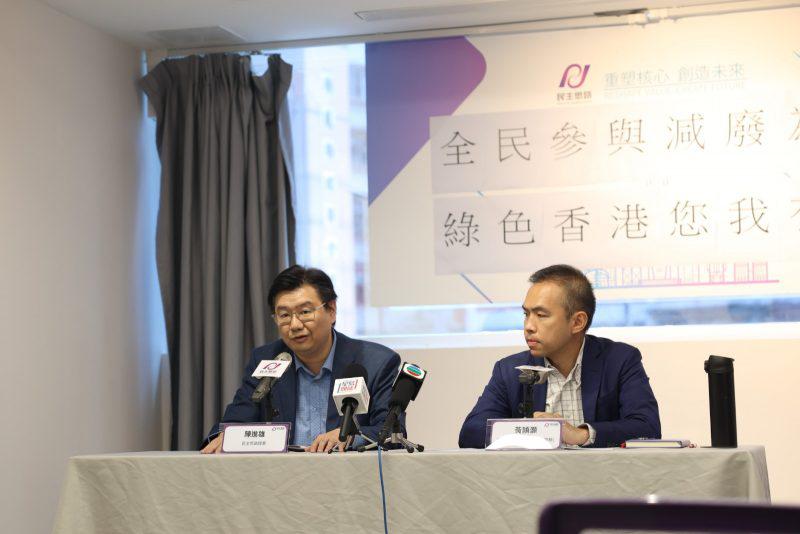【Press release】
29 May 2024
Path of Democracy Calls for Community Collaboration to Promote Waste Reduction Policy--
"Everyone Participates, Waste Reduction First, Green Hong Kong, It’s Our Responsibility"
On May 27 (Monday), the government addressed the Legislative Council regarding the Municipal Solid Waste Charging (“MSW Charging”). Deputy Chief Secretary for Administration Cheuk Wing-hing announced a postponement of the MSW Charging Scheme, originally scheduled to take effect on August 1, for a review in one year. In response, the Path of Democracy (“PoD”) held a press conference today (May 28) to express their stance on the government’s recent decision to delay the MSW Charging Scheme.
PoD Co-convener (Internal and District Affairs) Allan Wong states that although the MSW Charging legislation has been passed by the Legislative Council, it is now at risk of being overturned. Recent trial results indicate that public awareness of environmental recycling is increasing. The amount of food waste recycled in Hong Kong has tripled in just a few months this year, showing that the policy is effective. However, the government’s MSW Charging Demonstration Scheme report indicates that many residents find the measures inconvenient, and the designated garbage bag usage rate is low. Nonetheless, certain pilot areas, such as government departments, institutions, and businesses, have achieved a 70% usage rate, and the amount of garbage has decreased by 10% to 20%. Over the past decade, Hong Kong’s overall solid waste volume has increased by 20%, making these results a strong KPI, fully reflecting a results-oriented approach and demonstrating that the polluter-pays policy is effective in achieving waste reduction.
According to Hong Kong government Legislative Council documents, the recycling volume of the “Green@Community” recycling network in 2022 was 20,300 tons, with a cost of HKD 11,133 per ton. Some legislators have suggested the “Green$ Electronic Participation Incentive Scheme” to incentivize public recycling, but the required expenditure would be as high as HKD 7.3 billion. These proposals indicate that the government’s recycling policies, presented without thorough calculation, could lead to financial issues and may be unsustainable.
Wong summarizes as in light of recent public opposition, he understands the government’s decision to temporarily delay the MSW Charging. However, he agrees with the “polluter pays” principle. Referring to cases from other regions, Wong notes that although the public initially opposed the policy, much like in Hong Kong, the government proceeded with education campaigns and strengthened recycling efforts, adhering to the original schedule. Two years later, after witnessing the benefits of waste reduction, the public came to support the waste levy policy. Therefore, whether the “polluter pays” and source separation is seen as a nuisance or a civic duty depends on the outcome. Wong believes that residents who see successful results will proudly consider it a civic duty, while those who do not will view it as a nuisance.
Wong emphasizes that the proposal was passed with a significant majority in 2021, and legislators should unite to support the waste levy rather than praise the government for postponing it in response to public backlash. As leaders who understand the policy better than the average citizen, they should convey what citizens need to hear, not just what they want to hear.
PoD Governor, Jeffrey Chan, believes that after passing the proposal, legislators should act as a voice for the citizens, bringing their concerns into the system to improve policy implementation. Simultaneously, they should help the public understand the operations of the waste levy and recycling processes. Environmental groups should not remain silent but instead assist the government in promoting and explaining the policy, encouraging citizens to recycle waste and food scraps. Silence only creates the impression of distancing from the government. Given the economic downturn, opposition from the business sector is expected, so the government and environmental groups need to provide support to reduce their resistance to the policy. The policy does not need an indefinite postponement. Instead, the government should set waste reduction targets to facilitate collaborative efforts across society to achieve waste reduction.
Recently, several legislators suggested in the Legislative Council that Hong Kong could discuss integrated waste resource management in the Greater Bay Area with the mainland, with the mainland assisting in handling some of Hong Kong’s solid waste. Wong questions why Hong Kong, under the “One Country, Two Systems” framework, cannot solve its own garbage problem and instead has to send its waste back to the mainland. Although they are part of one country, Hong Kong and the mainland are two separate customs territories. In December 2020, the Ministry of Ecology and Environment, the Ministry of Commerce, the National Development and Reform Commission, and the General Administration of Customs of PRC issued a notice on the complete ban on the import of solid waste. This notice clearly stated that from January 1, 2021, China would prohibit the import of solid waste in any form and would ban the dumping, stacking, and disposal of overseas solid waste within its borders. Consequently, under the “One Country, Two Systems”, Hong Kong has been unable to export any classified waste to the Mainland since 2021. Wong questions why Hong Kong, unable to solve its own waste problem, would expect the Central Government to amend national regulations, thereby inconveniencing the Mainland. He argues that Hong Kong should take responsibility for its own waste management.
Wong believes that waste reduction at the source has never been solely an action by the government. Instead, it is the government’s policy to promote waste reduction among the public. The MSW Charging Scheme requires significant political and administrative skills, involving not only government authorities as the primary responsible party but also the cooperation of officials, legislators, businesses, and citizens. In successful cases abroad, after such a controversial bill is unanimously passed by legislators, both legislators and the business community must agree with the “polluter pays” principle to support it. Thus, its supporters should also recognize this principle for the bill to pass. Consequently, officials, legislators, businesses, and citizens must work together in community outreach, explaining the policy’s original intent and jointly assisting in implementing the waste levy policy. Even though there might initially be significant public backlash, success is achievable through the joint efforts of these groups.
Hong Kong, however, lacks a similar political alliance. After the MSW Charging Scheme was passed in 2020, there has been little to no promotion or planning, nor has there been participation from officials, businesses, and citizens in advocating and explaining the policy. Instead, populism has taken over when public backlash occurs, leading the government to indefinitely postpone the policy under pressure from various quarters. Some legislators even hope the government will “reconsider” the MSW Charging Scheme, undermining the “existing law” passed by the Legislative Council. This indicates that a governance alliance supporting the waste levy has never existed. Compared to other cities that have successfully implemented waste levies, what results have we delivered in Hong Kong’s urban solid waste management?
Photo 1: PoD Co-convener Allan Wong (right) and Governor Jeffrey Chan (left)

Photo 2: Photo 1: PoD Co-convener Allan Wong (right) and Governor Jeffrey Chan (left)

Photo 3: PoD Co-convener Allan Wong (right) and Governor Jeffrey Chan (left)
 If you have any questions, please contact us by calling 3795 5586 and 4615 1776.
If you have any questions, please contact us by calling 3795 5586 and 4615 1776.

 EN
EN Login
Login Donation
Donation

 Back
Back